Beyond the Bike
Ubernomics and Income Inequality in South Africa…
When an unemployed teacher can rationally afford a taxi ride to Sunday lunch and the driver’s main job is as General Manager of the Coca Cola factory in Cape Town, economists’ alarm bells should start ringing. Welcome to the world of Uber. The said unemployed (economics) teacher took some time off ferrying Africans down their continent on his tandem and took advantage of the Rand’s weakness to enjoy a few motorised rides around the Cape…

Tonderai & Liberty: two Zimbabwean Immigrants making a life in South Africa, thanks to Uber?
There has been a lot of column inches dedicated to Uber, the new sharing/on-demand economy and how it is changing the world. What about its impact and relationship with the other big trend in our 21st Century world, highlighted in Thomas Piketty’s magnum opus, namely income inequality? South Africa is the most unequal country on the planet, according to the IMF. Thus, it seems the obvious place to tackle this issue.
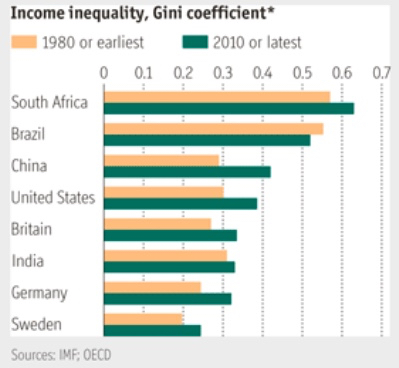
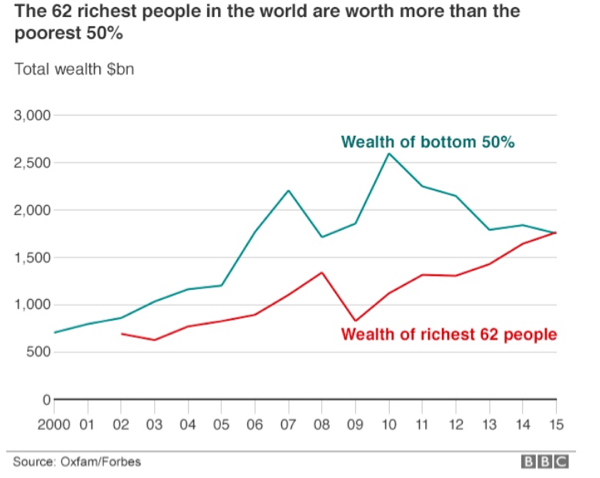
South Africa is nearly twice as unequal as Britain; Piketty’s trend is nicely picked up in the Oxfam chart, although the statistics are questionable1
Shafiek was the driver who picked Claire & me up and ferried us around Table Mountain to the leafy suburb of Rondesbosh for our lunch. ‘This isn’t my usual job’ he smiled when I asked him, ‘I’m just covering for my daughter who is an Uber driver in her spare time to help pay for her studies’. (Appropriately business and marketing at the local university). Therein lies one of the advantages of Uber: its flexibility and ability for households to turn their consumer goods (cars) into capital goods and earn a return.
Other oft-cited benefits of Uber are a better service for lower-middle income households who wouldn’t otherwise be served, according to the New York Post Newspaper; greater efficiency (no waiting around in the rain trying to hail a cab) and of course lower prices from the higher competition and ‘creative destruction’ in the existing marketplace. It is these latter arguments that led every economist surveyed in a recent poll3 to (uncharacteristically) agree that Uber benefits consumers. A final, more debatable point, is that it allows taxi drivers to become entrepreneurs rather than employees, taking advantage of the minimal barriers to entry.
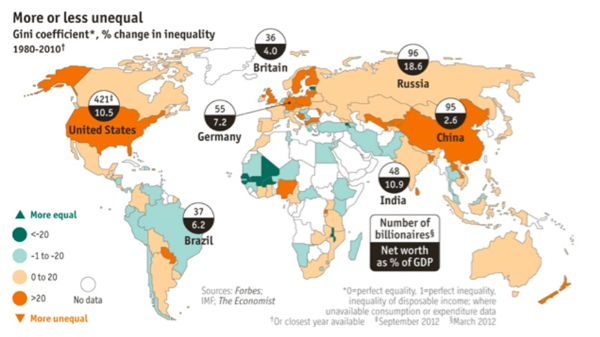
Income Inequality has risen in most countries in the last 30 years
That is all very well for those with the savings to buy a car or lucky enough to have Mum and Dad’s second family car. This was not the case for most of the other drivers we met who were not in the same fortunate position as Shafiek (and his daughter). Unsurprisingly, and linking to my previous blog, five out of the six were Zimbabwean immigrants.
Edmore, who gave us a lift back from the lunch, had been in South Africa for 4 years, was leasing his car. ‘Once I have paid the financing and Uber’s fee (20%), I am not left with much, especially outside the holiday season’ he said, ‘but I guess it is better than being back in Zim.’ he managed a chuckle. ‘What about getting finance for your business from your (regular) passengers’? I asked. ‘Hmm’, he thought, 'but I don’t want to give away too much equity otherwise I don’t earn much of a return’, came the MBA style answer. As I pointed out in my last blog, most Zimbabweans in SA are over-qualified for their jobs.
Tonderai, meanwhile, who gave us our final lift to the airport was working for an entrepreneur who owned several cars and employed drivers.
‘I have to work very hard. I have a target of 3000 Rand (c 30 trips). If I miss the target, I don’t get paid. Anything over is mine’
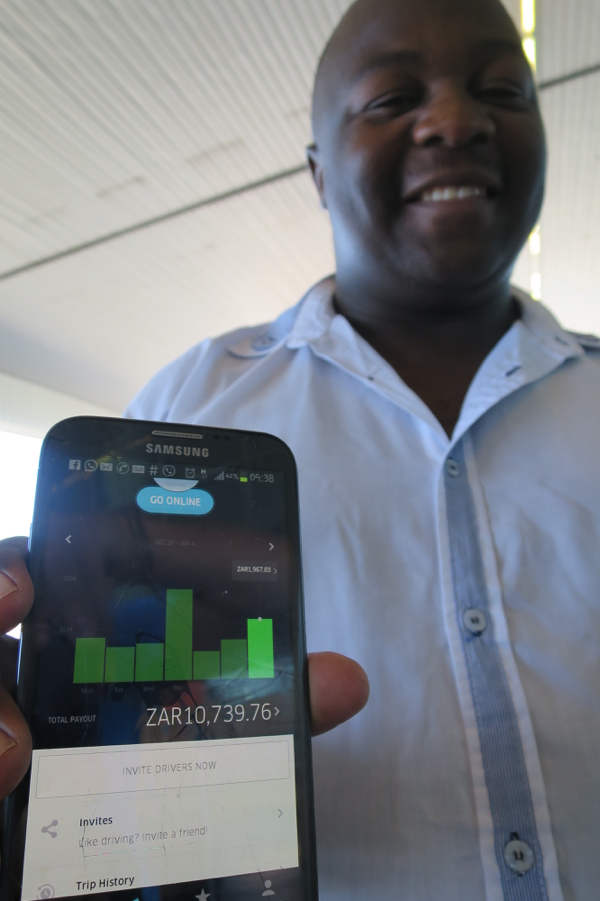
Happy Drivers? A better week’s work for Tonderai during the NY holiday season
In a country with high unemployment and no welfare state for immigrants, there is little choice for Tonderai. With Uber not enforcing an upper limit on hours, 50 hours of driving per week in search of customers are not unusual.
Therein lies the main criticism of the likes of Uber, namely that it relies on and takes advantage of the large pool of low paid and low skilled workers seeking employment. As one Indian blogger puts it, citing the existence of on-demand services in Mumbai way before the first i-phone, ‘It did not take technology to spur the on-demand economy. It took masses of poor people’. Moreover, it can be argued that Uber ‘free-rides’ on the existing transport and technological infrastucture without having to take the risk of the traditional corporate of having to formally employ their drivers.
Another interesting criticisim from a Veteran Tech journalist Bob Sulivan in the US is that Uber’s prices are too low and creating a ‘race to the bottom’. 'Destructive competition drives prices so low, at some point it comes apart because people can’t make a living at it… cars fall apart. You are into safety issues.' Will there be human drivers in 10 years, I wonder? Sullivan goes on to criticism the dynamic pricing model, where consumer can never be sure when the services is going to rise three fold in the next hour. ‘Can you name another good or service with a price that can fluctuate 500 percent, or even 1,000 percent, during a single evening?’ he asks. I certainly can’t! ‘Dynamic pricing is information warfare, and consumers are fighting supercomputers with an abacus’ he finishes with a nice historical analogy.
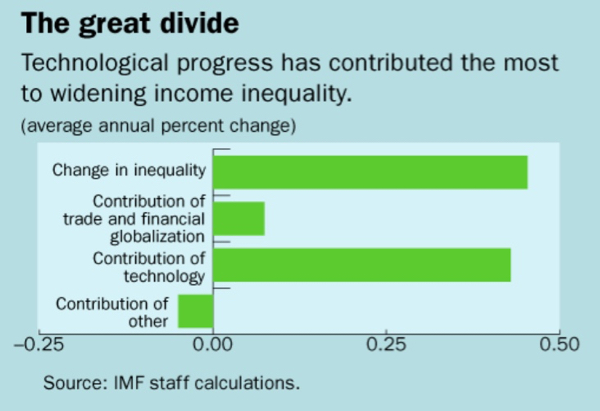
Should we be blaming technology for widening income inequality?
So, is Uber a wonderful innovation in the latest industrial revolution or another sign of the damaging effects of unfettered capitalism in today’s globalised economy? This is definitely a topic where I’m going to revert to the traditional economist’s place on the fence. Personally, as a consumer of Uber, it is great and my soclal interaction with its drivers has been more pleasant than with London’s black cabs', its most vocifierous critics. In terms of Income Inequality, most meaty economic studies report that income inequality is indeed caused more by technological progress rather than globalisation (of course, the two are entwined) and Uber is the very epitome of this new brave new world.
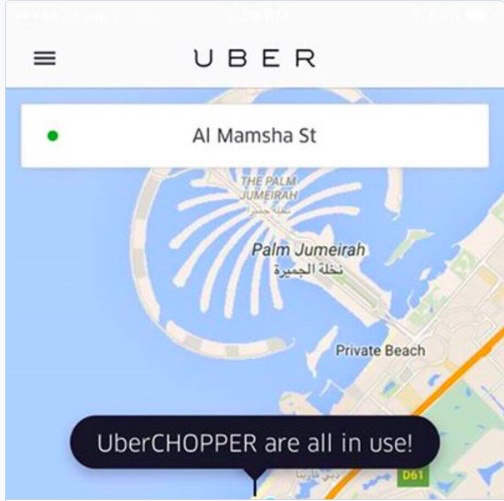
First World Problems in Dubai
PS I’m writing this from Dubai where we are in transit between Africa & Asia. There is a 3rd option for Uber here, namely - ‘Uber-Chopper’. Really? Yes, I am afraid so. Now the UAE is a strange place. There is no visible poverty as you drive in from the airport as you find in Cape Town. But the ominous ‘no data available’ in the Gini chart above hides a sad contrast between the obscene wealth amongst some of the ruling class and terrible poverty amongst some of the, mainly Asian, immigrants who build the gleaming towers. Strangely Uber is more expensive than normal taxis in the UAE.
Links:
1. Oxfam’s report was released to coincide with the World Economic Forum in Davos. For a summary, see the BBC’s analysis of the recent Oxfam claim on Income Inequality. http://www.bbc.com/news/business-35339475
2. See New Yorl Post - http://nypost.com/2015/09/03/how-uber-is-reducing-inequality/
3. See Daily Telegraph - http://www.telegraph.co.uk/technology/uber/11902310/Almost-every-economist-agrees-Uber-makes-us-better-off.html
4. Bob Sullivan’s article can be found on Geekwire - http://www.geekwire.com/2015/6-reasons-ubernomics-fatal-customers-mass-transit/
5. See IMF 2007 report - http://www.imf.org/external/pubs/ft/survey/so/2007/res1010a.htm
When you subscribe to the blog, we will send you an e-mail when there are new updates on the site so you wouldn't miss them.

